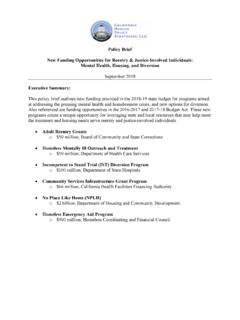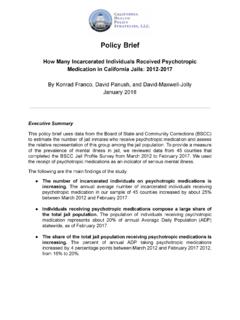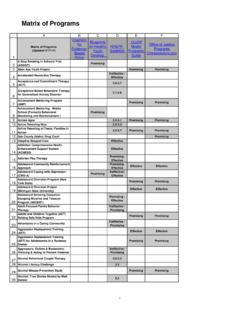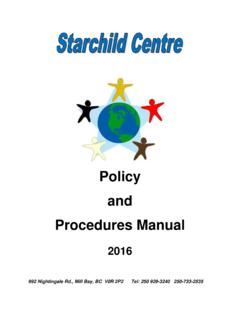Transcription of Policy Brief - calhps.com
1 Policy Brief Overview of reentry Focused Whole Person Care (WPC) Pilots June 2018. Overview The Whole Person Care (WPC) Pilot program is designed to coordinate health , behavioral health , and social services to improve the health outcomes of Medi-Cal beneficiaries who are high utilizers of the healthcare system. Collaborative leadership and systematic coordination among public and private entities is used to meet this goal. The WPC Pilot entities identify target populations, share data between systems, coordinate care in real time, and evaluate individual and population progress all with the goal of providing comprehensive coordinated care for the beneficiary resulting in better health outcomes among vulnerable populations. The WPC is a five-year program, approved in December 2015 as part of the Medi-Cal 2020 waiver. The program provides up to $3 billion to support the Pilots.
2 Reimbursement is not provided for services already covered by Medi-Cal. The California Department of health Care Services (DHCS) held two application rounds. Pilot-lead entities (usually a county government or county hospital) submitted an application to DHCS. The Medi-Cal 2020 waiver established some minimum standards for participation, but applicants had considerable flexibility to propose programs that target different populations and provide unique services or interventions. After both application phases, there are nine approved WPC pilots (Contra Costa, Kern, Los Angeles, Mendocino, Placer, Riverside, San Mateo, Santa Cruz, and Small County Collaborative) that have specifically targeted the vulnerable formerly incarcerated population. The criminal justice reentry population is at high risk of failing to connect with medical, behavioral health , and other services upon discharge from jail in addition to being at high risk for homelessness.
3 Moreover, the reentry population has exceptionally high rates of medical and behavioral health problems. Improving health care delivery to this group of individuals is an important endeavor. However, not all these counties that have identified formerly incarcerated individuals as a target population in their DHCS applications are dedicating the same amount of programmatic attention to the reentry population. There are four approved WPC pilots (Kern, Los Angeles, Placer, and Riverside) that are especially dedicated to serving individuals reentering the community post-incarceration and that have designed programs to directly engage local jails and/or probation departments. Pilots receive payment from DHCS based on their approved budgets and performance measures outlined in their approved applications. In year one, the Pilots were focused on infrastructure development and gathering baseline data.
4 In years two through five, the Pilots are focused on providing services, implementing interventions, and achieving metrics. Pilots must submit reports Policy Brief -- reentry Focused WPC Pilots to DHCS and will receive payment based on achieving the metrics outlined in their application. DHCS requires every Pilot to report universal and variant metrics both mid-year and annually. Universal metrics will be a same set of metrics required of all WPC pilots. Variant metrics will differ between pilots and will be tailored to the unique strategies and target population(s) of each Pilot. Universal metrics will assess the success of all WPC pilots in achieving the WPC goals and there are broad types of universal metrics ( health outcomes and administrative). Variant metrics are derived through a standardized process and these metrics vary widely across Pilots.
5 Each Pilot has a dedicated section of their application that details the both the universal and variant metrics for their program. This Brief delves into the details of how each WPC Pilot that has identified formerly incarcerated individuals as a target population plans to more effectively serve the needs of this vulnerable group. Specifically, this Brief discusses the following points for each Pilot that is targeting the reentry population: Pilot implementation and size;. Target population identification and engagement methods;. Services and interventions. The following Pilots are reviewed in this Brief : Contra Costa County Legacy Pilot Kern County Legacy Pilot Los Angeles Expansion Pilot Mendocino New Pilot Placer Legacy Pilot Riverside Legacy Pilot San Mateo Legacy Pilot Santa Cruz New Pilot Small County Collaborative New Pilot Note: Legacy Pilot WPC Pilot approved in November 2016 during Phase I of application review.
6 Implementation began on January 1st, 2017. Expansion Pilot WPC Pilot originally approved in November 2016 during Phase 1 of application review. Implementation first began on January 1st, 2017, but the implementation of the expansion began on July 1st, 2017. New Pilot WPC Pilot approved in June 2017 during Phase II of application review. Implementation began on July 1st, 2017. Page ii Policy Brief -- reentry Focused WPC Pilots Contra Costa County Legacy Pilot Pilot Implementation & Size The WPC Pilot for Contra Costa was approved in November 2016 during Phase I of DHCS review. Implementation for this program began on January 1st, 2017 and it is classified as a legacy pilot. The estimated five-year beneficiary count is 52,500 individuals and the total five-year budget is $203,958,160. Target Population Definition Contra Costa County target population consists of patients who are Medi-Cal recipients and who are primarily and repeatedly accessing health care services in high-acuity settings due to the complexity of their unmet medical, behavioral health and social needs.
7 The services offered under the pilot will include those that can address the specific needs this high-risk population when they have a history of recent incarceration. Target Population Identification & Engagement Ongoing population identification will occur through two primary strategies in Contra Costa: a. Monthly data runs to identify patients who are entering the target population based on utilization and claim charges. b. Opt-in referrals for previously unidentified high-need patients as identified by Contra Costa health Services (CCHS) or partner providers. reentry Services and Intervention Post-incarceration services will be primarily available to patients through: a. The CCHS Reducing health Disparities Initiative, and b. The reentry Success Center, an outside contracted agency. Services from these two centers will include support groups, appointment scheduling monitoring, and general care coordination for social and health services.
8 The CCHS Transitions Clinic (targeting formerly incarcerated individuals) will serve as the primary care site for coordination of services, interpersonal skill development, life skills coaching, social services linkages and money management. Contra Costa aims to have this staff trained in motivational interviewing, anger management, and cultural competency. Services will ideally be gender-responsive and tailored to support clients' ability to make positive and healthy choices. Housing services provided to recently incarcerated patients unable to find housing or at risk of losing their housing will include vulnerability assessments using the VI-SPDAT tool, landlord and property management engagement and relationship development, assistance with rental applications, resources for paying utility bills and moving expenses, eviction avoidance assistance, and continued support to recently housed reentering patients.
9 Legal support will be provided through the participation of Bay Area Legal Aid (BayLegal). Legal support is an identified need Page 1. Policy Brief -- reentry Focused WPC Pilots for many in this target population. BayLegal will provide enrolled patients with free legal assistance, including advice and counsel, Brief services and full legal representation, and advocacy. Page 2. Policy Brief -- reentry Focused WPC Pilots Kern County Legacy Pilot Pilot Implementation & Size The WPC Pilot for Kern County was approved in November 2016 during Phase I of DHCS review. Implementation of this program began on January 1st, 2017 and it is classified as a legacy pilot. The estimated five-year beneficiary count is 2,000 individuals and the total five-year budget is $157,346,500. Target Population Definition Kern County aims to target Medi-Cal beneficiaries who have a history of high emergency room or inpatient utilization and provide additional services to those in this group who are homeless or at risk of homelessness and who have been recently incarcerated.
10 The enhanced services are intended to directly address the health risks faced by these groups. Target Population Identification & Engagement The pilot will initially receive referrals from the two large (and local) managed care partners and from Kern Medical Center, who contracts with the County for correctional medicine services. These beneficiaries will be asked to opt-in to the WPC program. reentry Services and Intervention To address the needs of this target population, Kern County will establish a clinic directly outside of the jail so that upon release, prisoners who have obtained presumptive Medi-Cal eligibility can obtain an immediate wellness check. Pharmacists in the clinic will provide medication reconciliations, medication education regarding chronic diagnosis management, and ensure that these individuals have two weeks of prescriptions and means to retrieve these prescriptions.








